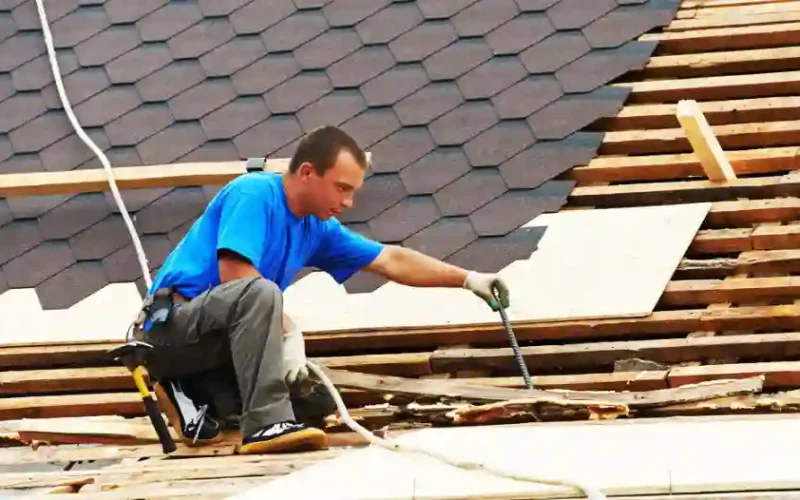When it comes to roofing projects, whether it’s a residential home or a commercial building, the importance of a sturdy and reliable roof cannot be overstated. However, roofing needs and considerations can vary significantly between residential and commercial projects. Understanding the key differences between roofing contractors for these two types of projects is essential for making informed decisions and ensuring the success of your roofing endeavor. In this article, we’ll explore the distinctions between roofing contractors for residential and commercial projects and why these differences matter.
Project Scale and Complexity
One of the most noticeable differences between residential and commercial roofing projects is the scale and complexity of the work involved:
Residential Roofing:
- Project Scale: Residential roofing projects typically involve smaller roofs and structures, such as single-family homes, townhouses, or condominiums.
- Complexity: While residential roofing can include various roofing materials and designs, it is generally less complex than commercial roofing. Common residential materials include asphalt shingles, cedar shakes, and metal roofing.
Commercial Roofing:
- Project Scale: Commercial roofing projects encompass larger and more extensive roofing systems, covering a wide range of commercial properties, from office buildings and warehouses to retail spaces and industrial facilities.
- Complexity: Commercial roofing often involves specialized roofing systems like single-ply membranes, built-up roofing, or metal roofing. The complexity increases due to factors such as roof penetrations, HVAC equipment, and drainage systems.
Regulations and Codes
Residential and commercial roofing projects are subject to different regulations and building codes:
Residential Roofing:
- Regulations: Residential roofing projects are generally subject to local residential building codes, which focus on safety, structural integrity, and weather resistance.
- Permits: Obtaining permits for residential roofing projects is typically straightforward, and the process varies depending on local regulations.
Commercial Roofing:
- Regulations: Commercial roofing projects are subject to more stringent and complex regulations, as commercial properties often have more extensive safety and occupancy requirements.
- Building Codes: Commercial roofing must adhere to specific commercial building codes, which vary based on the type and use of the commercial property.
- Fire Ratings: Commercial roofing may need to meet higher fire resistance standards, depending on the building’s occupancy classification.
- Accessibility: Commercial properties often require safe and accessible roof access points for maintenance and inspections.
Materials and Systems
The choice of roofing materials and systems differs significantly between residential and commercial projects:
Residential Roofing:
- Materials: Common residential roofing materials include asphalt shingles, wood shakes, metal roofing, and tile roofing.
- Design: Residential roofs often feature simple gable or hip designs with relatively straightforward pitches.
Commercial Roofing:
- Materials: Commercial roofing materials include single-ply membranes (e.g., TPO, EPDM), built-up roofing (BUR), modified bitumen, metal roofing, and cool roofing materials.
- Design: Commercial roofs can have diverse designs, including flat or low-slope roofs, complex geometries, and rooftop equipment that requires careful integration.
Installation and Workforce
The installation process and workforce qualifications vary between residential and commercial roofing projects:
Residential Roofing:
- Installation: Residential roofing projects are typically completed by smaller crews with a focus on efficiency and speed.
- Workforce: While skilled labor is essential, the workforce for residential projects is often smaller and more nimble.
Commercial Roofing:
- Installation: Commercial roofing projects require larger and more specialized crews due to the scale and complexity of the work.
- Workforce: Commercial roofing contractors often employ skilled professionals with specific expertise in various roofing systems and materials.
Timeline and Project Duration
The timeline and project duration also differ between residential and commercial roofing projects:
Residential Roofing:
- Timeline: Residential roofing projects tend to have shorter timelines due to the smaller scale of the work.
- Disruption: Minimal disruption to homeowners, as residential projects can often be completed in a matter of days.
Commercial Roofing:
- Timeline: Commercial roofing projects typically have longer timelines due to the complexity of the work and the need to accommodate the building’s operational requirements.
- Planning: Extensive planning is necessary to minimize disruptions to businesses or tenants during the roofing project.
Budget Considerations
The budgetary considerations for residential and commercial roofing projects can vary significantly:
Residential Roofing:
- Cost: Residential roofing projects are generally less expensive than commercial projects due to the smaller scale and fewer material requirements.
- Materials: The choice of materials often leans toward cost-effective options suitable for residential structures.
Commercial Roofing:
- Cost: Commercial roofing projects tend to have a higher overall cost due to the larger scale, specialized materials, and complex designs.
- Long-Term Investment: Commercial property owners often view roofing as a long-term investment, choosing materials and systems with a focus on durability and energy efficiency.
Maintenance and Repairs
The maintenance and repair needs of residential and commercial roofing also differ:
Residential Roofing:
- Maintenance: Regular maintenance is essential but generally simpler for residential roofs.
- Repairs: Repairs are typically localized, addressing specific issues such as damaged shingles or flashing.
Commercial Roofing:
- Maintenance: Commercial roofing systems require more comprehensive maintenance, including inspections, sealant applications, and addressing potential vulnerabilities in large flat or low-slope roofs.
- Repairs: Commercial roofing repairs may involve more extensive work to address leaks or damage across a larger surface area.
Selecting the Right Roofing Contractor
When choosing a roofing contractor for either residential or commercial projects, it’s crucial to consider the specific needs and complexities of the project. Here are some tips for selecting the right roofing contractor:
- Specialization: Choose a contractor with experience in the type of roofing project you need, whether it’s residential or commercial.
- Credentials: Ensure the contractor is licensed, insured, and certified in the relevant roofing systems and materials.
- References: Request and check references from previous clients who had similar roofing projects.
- Transparency: A reputable contractor should be transparent about costs, timelines, and the scope of work.
- Local Knowledge: Contractors familiar with local regulations and climate conditions can better navigate permitting and material selection.
- Warranties: Inquire about warranties and guarantees offered by the contractor for both materials and workmanship.
- Communication: Effective communication throughout the project is essential for a successful roofing endeavor.
- Budget: Obtain multiple quotes and consider the value and quality of services provided in addition to cost.
In Conclusion
Residential and commercial roofing projects each come with their own set of considerations, from regulations and materials to installation processes and project durations. Understanding the key differences between these two types of roofing projects is crucial for selecting the right roofing contractor and ensuring the successful completion of your roofing endeavor. Whether you’re protecting your family home or safeguarding a commercial property, a well-informed approach to roofing is essential for long-term durability and peace of mind.











